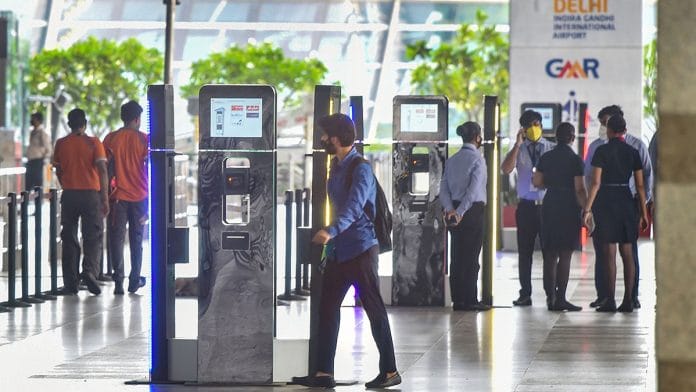New Delhi: With domestic air travel set to resume from Monday and train services beginning from 1 June, the health ministry Sunday issued guidelines for air, train and inter-state travel.
According to the detailed set of guidelines, all railway stations, airports and bus stops will practise social distancing norms and will be sanitised regularly.
It directs the states to ensure the availability of soaps and sanitisers at these places. Passengers will have to use face cover/masks and follow hand hygiene, respiratory hygiene and maintain environmental hygiene.
All states and union territories will also have to ensure that every passenger undergoes thermal screening at the point of departure and only asymptomatic passengers will be allowed to board the flight, train or bus.
Those passengers who have moderate or severe symptoms of Covid-19 will be isolated and taken to dedicated Covid-19 facilities for quarantine. Passengers with mild symptoms can choose to self-isolate at their homes or at a public or private Covid-19 care centre.
If one of these passengers tests positive for the virus, he or she will have to continue staying at the quarantine centre and will be managed as per clinical protocol, state the orders.
Asymptomatic passengers will be permitted to travel with the advice that they self-monitor their health for 14 days. In case they develop symptoms they will be required to inform the district surveillance officer or the state/national call centre.
The guidelines also say states can develop their own protocols regarding domestic travellers.
Also read: UV luggage cleaners, shoe disinfectants — how Delhi’s T3 airport is preparing for fliers
Aarogya Setu not mandatory, but passengers ‘advised’ to download
The ministry clarified that it will not be mandatory for passengers to download the contact-tracing app Aarogya Setu. Instead, the guidelines state that the passengers are “advised” to do so.
For international flights, all travellers, before boarding, will have to sign an undertaking agreeing to undergo mandatory quarantine for 7-14 days at an institutional quarantine, followed by seven days of isolation at home and self-monitoring of their health. The costs of institutional quarantine will be borne by the passengers.
Passengers arriving through the land borders will also have to undergo the same protocols as mentioned above, and only those who are asymptomatic will be allowed to enter India.
Self-declaration forms will be made available to all those travelling in flights or ships and a copy of the same will have to be given to the Health and Immigration officials present at the airport/ seaport/ land port. The form may also be made available on the Aarogya Setu app.
The central government’s decision to allow domestic air service to resume operations from Monday has run into trouble with three big states — Maharashtra, West Bengal and Tamil Nadu.
They have expressed concerns about resuming flight operations, claiming that they are not prepared to handle the logistics involved because of the growing number of Covid-19 cases in the states.
West Bengal, which was recently battered by the super-cyclone Amphan that wreaked unprecedented destruction in the state, has sought more time to allow passengers to enter the state..
Also read: ‘Need people to cooperate’ — officials defend chaos at Delhi airport over COVID-19 screening






